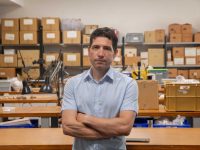Materials science for a more sustainable future
Mario Culebras is a researcher at the Institute of Materials Science of the University of Valencia

My name is Mario Culebras, and I am a tenure-track 1 professor in the Department of Physical Chemistry and a researcher at the Institute of Materials Science of the University of Valencia.
Specifically, I am part of the Macromolecules and Colloids for Sustainable Materials (MacroCoSM) group. Our work involves developing new technologies and materials based on polymeric compounds found in everyday products, ranging from common plastics (polyethylene and propylene) to the proteins in our bodies.
One of our lines of research involves using agricultural and forestry waste to produce materials for use in the energy sector. We use this material to produce a variety of things. Firstly, we produce carbon nanostructures, which are used in the electrodes of batteries or supercapacitors. Secondly, we use them to produce hydrogels, which are used in the development of ionic thermoelectric materials that can later be converted into electrical energy.
During my postdoctoral research, I began working on a project that aims to produce carbon fibres using lignin. Lignin is a by-product of the paper industry, resulting from the extraction of cellulose, and is typically incinerated. Developing carbon fibres using lignin is an interesting project because these fibres are important in the aerospace and wind energy industries (they are used to make wind turbine blades). They are also used in sports applications, such as in Formula 1 cars. Currently, all these fibres are made from a petroleum-derived polymer that has a significant environmental impact. Therefore, developing sustainable carbon fibres would reduce environmental impact and energy expenditure considerably.

Mario Culebras after the interview / Photo: Laura García.
This demonstrates the fundamental role of science in developing a more sustainable world. In a sense, science is responsible for reducing the environmental impact of all technology and materials produced.
Science plays a key role in providing solutions for a more planet-friendly future. This includes finding ways to generate energy and develop materials, as well as searching for solutions to mitigate the effects of climate change. By using sustainable resources and adopting a circular approach to products, science can transform the current production model into one that is more sustainable without compromising our quality of life. However, these projects require funding to be carried out.
Interview by Marta Gutiérrez and Anna Mateu. Edited by Marta Gutiérrez.





